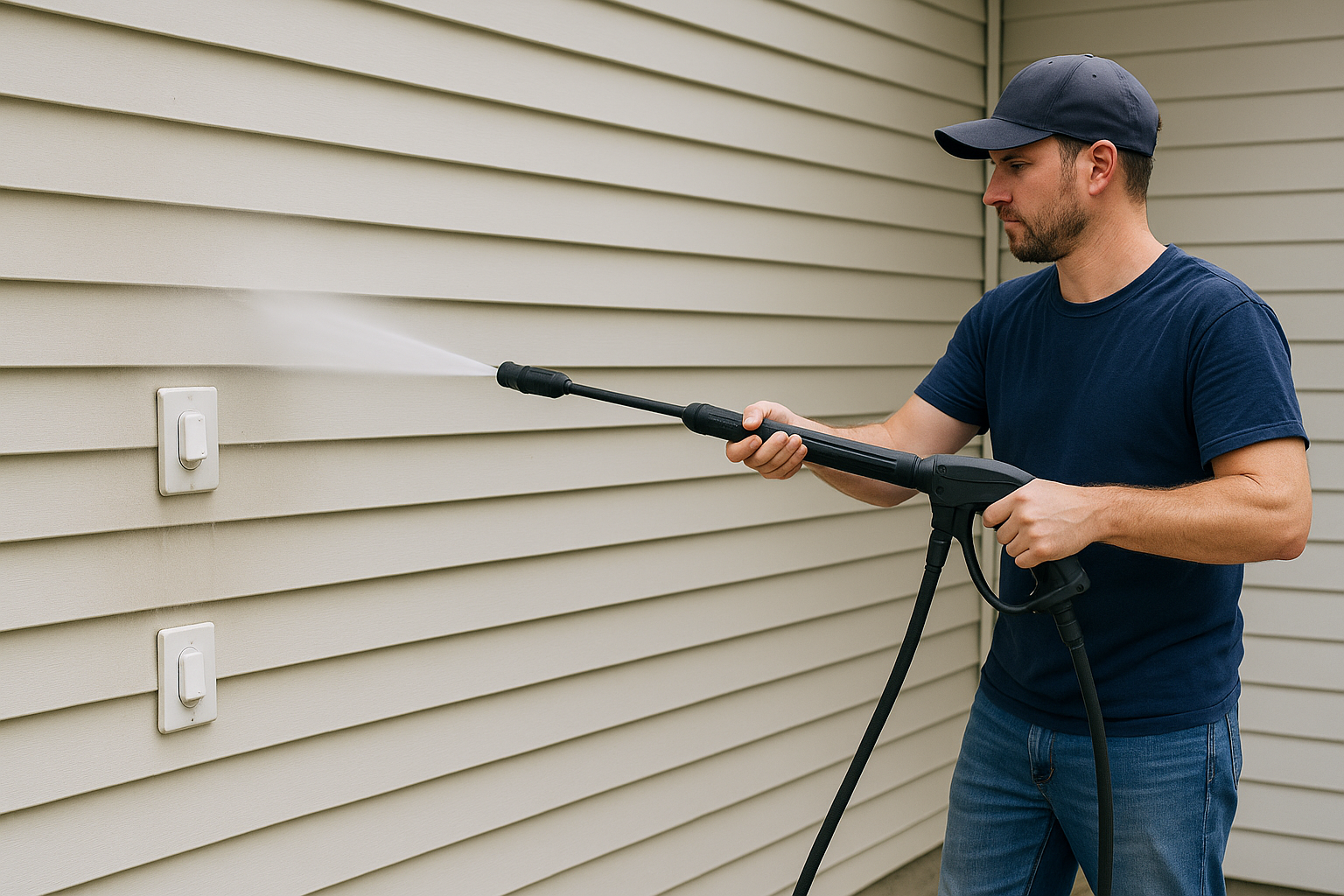
Power washing is one of the most effective ways to clean a home’s exterior — blasting away dirt, mold, algae, and years of grime with ease. But when you’re dealing with electrical fixtures and outlets, that high-pressure stream of water can go from helpful to hazardous in seconds. ⚠️💦
Whether you’re a homeowner doing a DIY job or a professional offering exterior cleaning services, knowing how to safely power wash around electrical components is critical for avoiding property damage, personal injury, and costly mistakes.
In this article, we’ll break down:
- The electrical hazards of pressure washing
- Which areas to avoid (and how to clean them safely)
- Practical tools and tips to protect your property and yourself
Let’s plug into this important topic. 🔌🧼
🔌 Where Are Electrical Hazards Found Outside the Home?
Outdoor electrical components are more common than most people realize. Be on the lookout for:
- Exterior outlets (GFCIs)
- Light fixtures on walls, garages, and patios
- Electric meters or smart panels
- HVAC units with exposed wiring
- Wiring conduits or junction boxes
- Security cameras or smart doorbells
- Landscape lighting or solar panel inverters
💡 Most of these are designed to withstand some water exposure — but not direct, high-pressure water blasting at 2,000–3,000 PSI.
⚠️ What Can Go Wrong?
Power washing near electrical systems can cause serious problems if not handled carefully.
Common Risks:
- Short Circuits – Water infiltration into outlets or boxes can create dangerous shorts
- Electric Shock – Especially if wires are exposed or components are damaged
- Fire Risk – In rare cases, faulty connections can spark post-wash
- Tripped Breakers or Damaged Panels – Resulting in costly repairs
- Warranty Voids – Damaging covered components might void home warranties
💥 Even a brief spray in the wrong spot can have expensive consequences — or worse, be life-threatening.
🧼 How to Power Wash Near Electrical Components — Safely
✅ 1. Turn Off Exterior Power When Possible
If your breaker box is accessible and you know how to use it safely, shut off:
- Outdoor outlets
- Exterior lights
- Garage or patio circuits
If in doubt, ask an electrician or avoid the area altogether.
✅ 2. Cover All Exposed Electrical Fixtures
Use waterproof plastic or heavy-duty contractor bags and duct tape to seal:
- GFCI outlets
- Light fixtures
- Exposed wiring
- Panel boxes
🛡️ This prevents direct water contact and keeps moisture out of delicate components.
✅ 3. Use Low Pressure and Wide Spray Near Fixtures
Dial down your power washer when near sensitive areas. Use:
- A 40-degree nozzle tip (white tip) for gentle pressure
- At least 6 feet of distance from any outlet or fixture
- Soft washing techniques when cleaning around electric meters or junction boxes
💧 Gentle cleaning minimizes the chance of forcing water inside protective covers.
Browse Amazon Here For Soft Washing Equipment And Accessories
✅ 4. Don’t Spray Directly Into Fixtures or Seals
This may seem obvious, but it’s a common mistake. Avoid:
- Spraying upward into overhangs or light fixtures
- Spraying at seams in electrical boxes
- Spraying directly into doorbell cameras or motion sensors
🧠 Think of electrical elements like your phone: water-resistant doesn’t mean waterproof under pressure.
✅ 5. Wait Before Turning Power Back On
After washing:
- Remove any plastic covers
- Let the area dry completely (at least 30–60 minutes)
- Inspect for any visible moisture or residue
- Restore power carefully
🌬️ Use a leaf blower or towel to speed up drying if necessary.
🧰 Bonus Gear for Safe Power Washing
Here are some tools that can make your job safer and more effective:
- Nozzle guards: Reduce spray scatter near fixtures
- Extension wands: Keep a safe distance from outlets and cameras
- Soft washing systems: Ideal for cleaning around sensitive areas
- Rubber boots/gloves: Personal protection if you’re washing solo
- GFCI testers: Ensure outlets are functioning properly after cleaning
🏡 Safe Zones vs. Danger Zones
| Safe to Wash Freely | Use Caution / Cover First |
|---|---|
| Siding (away from fixtures) ✅ | Electrical outlets ⚠️ |
| Fences ✅ | Exterior light fixtures ⚠️ |
| Driveways & sidewalks ✅ | Smart doorbells & cameras ⚠️ |
| Decks ✅ | HVAC units ⚠️ |
| Windows (low pressure) ✅ | Electrical panel boxes ⚠️ |
📣 What the Pros Say
Professional power washers are trained to identify electrical risks and clean around them. If you’re unsure — hire a pro. Many exterior cleaning companies:
- Carry insurance
- Have safety certifications
- Use specialized low-pressure tools
- Offer warranties against damage
Hiring help might cost a little more, but it’s worth it for the peace of mind. 💵🧑🔧
✅ Final Thoughts
Power washing can work wonders for your property — but not at the expense of safety. Knowing how to clean near electrical fixtures without causing damage or harm is critical for both DIY homeowners and professionals.
🔌 Turn off power where possible
🛡️ Cover and protect electrical elements
🚿 Use low pressure and avoid direct sprays
🕒 Allow time for drying
👀 Inspect before flipping the breaker back on
When in doubt, go slow — or bring in the pros. Your home (and your wiring) will thank you. 💪⚡🧼
Browse Amazon Here For Soft Washing Equipment And Accessories



